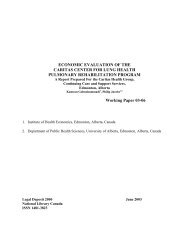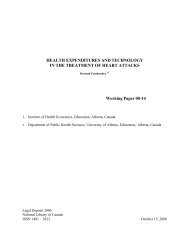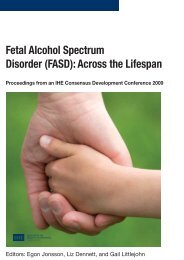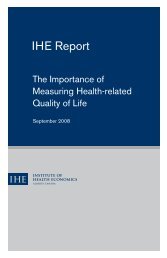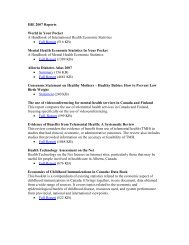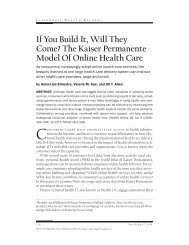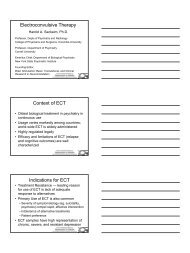Bariatric treatments for adult obesity - Institute of Health Economics
Bariatric treatments for adult obesity - Institute of Health Economics
Bariatric treatments for adult obesity - Institute of Health Economics
- No tags were found...
Create successful ePaper yourself
Turn your PDF publications into a flip-book with our unique Google optimized e-Paper software.
<strong>for</strong> studies with a mean age <strong>of</strong> participants <strong>of</strong> less than 45 years was a reduction in weight <strong>of</strong> 1.6kilograms in the exercise and diet group as compared to the diet alone group. The pooled effect <strong>for</strong>studies with a mean age <strong>of</strong> participants <strong>of</strong> greater than 45 years was a reduction in weight <strong>of</strong> 1.0kilograms in the exercise and diet group as compared to the diet alone group. However, nosubgroup analysis was conducted based on the BMI cut-<strong>of</strong>fs.BMIIn general, patients with a BMI less than 30 kg/m 2 were selected <strong>for</strong> lifestyle interventions,behavioural therapy, and pharmacotherapy, while patients with a BMI greater than 35 kg/m 2 (severe<strong>obesity</strong>) were considered <strong>for</strong> bariatric surgery. Some reviews included both overweight and obesepatients, but no sub-group analysis was conducted <strong>for</strong> different BMI cut-<strong>of</strong>fs.Presence <strong>of</strong> comorbidityIn a review 56 <strong>of</strong> lifestyle interventions, a subgroup analysis was conducted in overweight and obesepatients with impaired glucose tolerance in the prevention <strong>of</strong> diabetes. Compared with standard care(not defined), lifestyle interventions significantly reduced body weight and cardiovascular risk factorsbut had limited impact or no impact on low-density lipoprotein and HbA1c levels.Motivation/complianceHigh drop-out rates are a major problem with <strong>obesity</strong> studies and may contribute to a substantialvariation in outcomes such as weight loss among participants. 7Patients participating in <strong>obesity</strong> clinical trials usually achieve better results than non-trial participants,as they are more motivated and receive greater supervision and encouragement. Thus, results inclinical practice will inevitably be less favourable and more variable than those in a trial setting. 7A number <strong>of</strong> factors, listed in Table T.10, have been identified that may impact clinical outcomes.Strategies that address these factors may help achiving longer-term weight loss and weightmaintenance. 71Table T.10: Factors underlying weight regain after weight lossPre-treatmentPost-treatmentOlder age Weight reduction greater than 15% to 30%High number <strong>of</strong> previous dietsHigh maximum or baseline body weightFrequent binge eating“All or nothing” thinkingLack <strong>of</strong> dietary restraintLow level <strong>of</strong> exercise and diet self-efficacyLow motivationSource: Ulen et al., 2008 71Early weight regainNot responding to early weight regainHigh levels <strong>of</strong> perceived hungerDissatisfaction with weight lossLack <strong>of</strong> dietary restraintFrequent emotional eatingFrequent binge eatingDiet high in calories, fats, and sugarsDecreased frequency and level <strong>of</strong> exerciseTelevision viewing more than two to four hours/day<strong>Bariatric</strong> <strong>treatments</strong> <strong>for</strong> <strong>adult</strong> <strong>obesity</strong> 96



